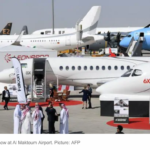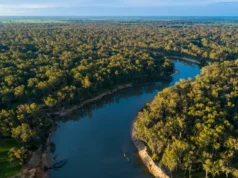Crowds at the Dubai Airshow this week were shocked to see something quite remarkable fall from the sky: rain.
It was a fitting climatic anomaly for an event that addressed the vexed issue of climate change and carbon emissions in the aviation industry.
Speaking at a roundtable discussion at Dubai’s Al Maktoum Airport, Emirates president Sir Tim Clark said airlines needed to do more to tackle emissions, but that differing government polices and the failure of some to even accept the reality of climate change was hampering the design of cohesive solutions.
“The Europeans do one thing, the French another, the Brits do something else. The US is not at the top level a believer in climate change. There’s no homogeny.”
He also queried the direction of New Zealand’s recently announced commitment to carbon neutrality by 2050.
“What exactly do they mean by carbon neutrality or zero emissions? Carbon neutrality by offsets is one thing — people like us going in and planting huge amounts of forest — but is that what you want? Is that what it means?” said Mr Clark.
“Frankly if they are going to be zero carbon — in other words they will not allow anything that chucks out carbon — that’s a big challenge. So it’s a noble, laudable aspiration, but if you’re serious it has to be more than an aspiration. Define exactly what it means and put it out there.”
Mr Clark said money was better spent on research and development of synthetic fuels.
“I don’t believe in the scalability of biofuel. The pursuit of synthetic fuel has got to be the way to go, to create a fuel that is sustainable and perfectly adequate for us to use for combustion of jet engines,” Mr Clark said.
“Emirates is not complacent about this and we are under an obligation to do something about it sooner rather than later.”
Emirates announced it was bolstering its own fleet significantly, signing purchase agreements on 50 Airbus A350-900s and 30 Boeing 787-9s, deals worth a combined list price of $US24.8bn.
Earlier this year the airline announced the cancellation of most existing orders for A380s — the world’s largest passenger plane — effectively signalling the death knell for the superjumbo.
The move comes as Emirates seeks to transition towards smaller, more fuel-efficient aircraft. A380s will remain in the Emirates fleet for some time yet, however, with the last expected to be retired in 2039.
Ultra-long-haul flights were another hot topic in light of Qantas’s recently trialled 19 hour New York to Sydney and London to Sydney “Project Sunrise” flights, which it hopes to eventually launch as scheduled passenger services.
Mr Clark said the key to getting the public receptive to ultra long-haul flights was enhancing the cabin experience. He said screens, connectivity and food and drink had made long haul flights such a joy now that passengers often didn’t want to get off. “We do 17-hours everyday (Auckland to Dubai) on an A380 with 455 people on it, and they’re all having a wonderful time, without psychologists or nutritionists or gymnasts.
“What Alan (Joyce, Qantas CEO) was doing was testing the anatomy’s response to these sorts of things. Our solution is a few glasses of champagne … it takes care of itself.”
While expressing disappointment that Qantas had dropped Dubai from its network, Mr Clark described the codeshare arrangement between the two airlines as “exceptionally good”.
Emirates recently dropped Brisbane to Singapore flights but it says no other Australian routes are under review.
Read the story here



